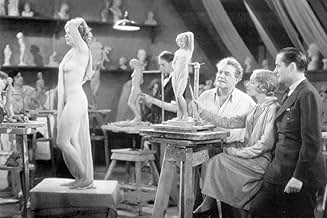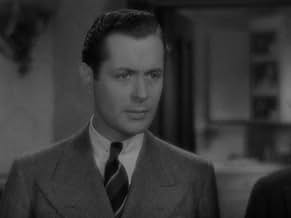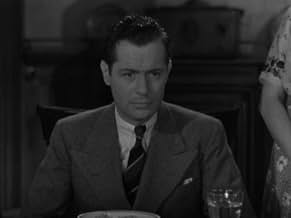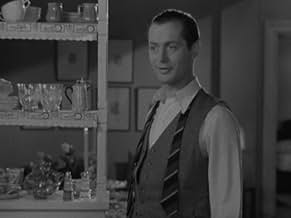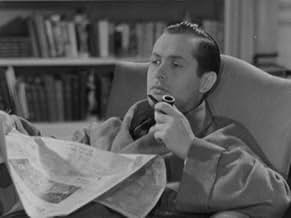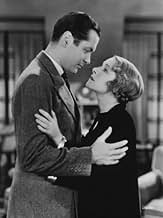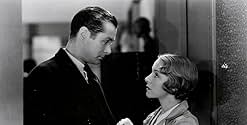A new bride learns she and her husband's stuck-up family don't speak the same language.A new bride learns she and her husband's stuck-up family don't speak the same language.A new bride learns she and her husband's stuck-up family don't speak the same language.
- Awards
- 3 wins total
Julia Bejarano
- Umbrella Peddler
- (uncredited)
William Farnum
- C. Forrester
- (uncredited)
Sherry Hall
- Purser
- (uncredited)
Featured reviews
ANOTHER LANGUAGE is the story of a marriage that suffers because the husband (ROBERT MONTGOMERY) is a self-centered snob ruled by a family that views its mother (LOUISE CLOSSER HALE) as the matriarch of the family who must be paid attention at all costs and smothers Montgomery with motherly affection. I loved the line spoken by HENRY TRAVERS, who tells her at a crucial moment, "Shut up, ma and don't faint. He's not looking."
HELEN HAYES gives one of her more natural performances on film. Very often she was prone to stage acting techniques, but here her manner is subdued and never overplayed. Montgomery is excellent and makes the man a weakling the viewer can never really warm up to until the final moments when he stands by her side.
Rose Franken was an expert at telling stories about family relationships, as she did with "Claudia" and the sequel "Claudia and David". Here she paints a vivid portrait of unpleasant family relationships.
In strong supporting roles, MARGARET HAMILTON and JOHN BEAL repeat their stage roles effectively.
HELEN HAYES gives one of her more natural performances on film. Very often she was prone to stage acting techniques, but here her manner is subdued and never overplayed. Montgomery is excellent and makes the man a weakling the viewer can never really warm up to until the final moments when he stands by her side.
Rose Franken was an expert at telling stories about family relationships, as she did with "Claudia" and the sequel "Claudia and David". Here she paints a vivid portrait of unpleasant family relationships.
In strong supporting roles, MARGARET HAMILTON and JOHN BEAL repeat their stage roles effectively.
Anyone interested in family relationships will surely enjoy this movie about a manipulative matriarch, Louise Closser Hale, who is not averse to fake fainting spells to get her way with her four sons and their wives. The acting is first-rate by a stellar cast, five of whom (John Beal, Hal K. Dawson, Irene Cattell, Maidel Turner and Margaret Hamilton) were in the original Broadway production which opened 25 April 1932, and who reprised their roles. This was also the film debut of Beal, Hamilton and Cattell (the only film she ever made). But kudos go to the magnificent Helen Hayes as the new addition to the family who stands up to Hale, John Beal, as her sensitive nephew who falls in love with her, and Robert Montgomery playing Hayes' husband, still under the control of his mother. I thoroughly enjoyed this movie. Stick with it until the end; the last 20 minutes are as riveting as any drama can be.
"Another Language" works because the whole is greater than the sum of its parts - and that is not meant to insult the parts. Robert Montgomery plays multiple roles, and he plays them all well: sometimes a genuinely caring husband, sometimes a stand-offish snob, and sometimes a superior bully. It's as if he was doing a greatest hits part.
It is Helen Hayes, however, in one her rare film appearances, who shines out a little more than everyone else. She was really a fine actress, here playing the increasingly isolated and desperate wife of Robert Montgomery, the victim of a squeezing out instigated by Montgomery's petty family. Interesting how at one point one of his "sister-in-laws" suggests that Hayes is "not even that pretty". I guess she really wasn't particularly so, her eyes in particular seemingly too far apart.
But the script moves along delightfully. The ensemble scenes, of which there are many, bringing all 10 or so characters on screen at one time, are surprisingly fun. This is because the writers have managed to accomplish something quite difficult, in allowing the different character's personalities slowly to come through. None of them is all good, but none of them is really all bad, though as a group they are intimidating to poor Helen Hayes.
Even Margaret Hamilton, made up and dressed up to be especially homely, who appears to be the nastiest of the women, shows a little humanity at times - but it is never overdone. A nice touch.
But Henry Travers, as the kindly father, is a source of frustration for the viewer: he knows the games that everyone is playing, and is genuinely sympathetic to Hayes, yet he never actually speaks up for her. This weakness is all the more irksome because it is his wife, the manipulative matriarch (played quite well by Louise Hale), with her many fake fainting spells, who is the cause of the film's discord, and though he is not afraid of her, he never helps out either.
An interesting film, and not as predictable as it might seem.
It is Helen Hayes, however, in one her rare film appearances, who shines out a little more than everyone else. She was really a fine actress, here playing the increasingly isolated and desperate wife of Robert Montgomery, the victim of a squeezing out instigated by Montgomery's petty family. Interesting how at one point one of his "sister-in-laws" suggests that Hayes is "not even that pretty". I guess she really wasn't particularly so, her eyes in particular seemingly too far apart.
But the script moves along delightfully. The ensemble scenes, of which there are many, bringing all 10 or so characters on screen at one time, are surprisingly fun. This is because the writers have managed to accomplish something quite difficult, in allowing the different character's personalities slowly to come through. None of them is all good, but none of them is really all bad, though as a group they are intimidating to poor Helen Hayes.
Even Margaret Hamilton, made up and dressed up to be especially homely, who appears to be the nastiest of the women, shows a little humanity at times - but it is never overdone. A nice touch.
But Henry Travers, as the kindly father, is a source of frustration for the viewer: he knows the games that everyone is playing, and is genuinely sympathetic to Hayes, yet he never actually speaks up for her. This weakness is all the more irksome because it is his wife, the manipulative matriarch (played quite well by Louise Hale), with her many fake fainting spells, who is the cause of the film's discord, and though he is not afraid of her, he never helps out either.
An interesting film, and not as predictable as it might seem.
Another Language from 1933 stars Robert Montgomery, Helen Hayes, John Beal, and Louise Closser. Directed by Edward H. Griffith.
Montgomery and Hayes are Victor and Stella, who fell in love in Europe and eloped. After meeting his family back in the states, she gradually realizes that he's basically smothered by their closeness, and they all dance to the tune of their mother (Closser). She's very manipulative, the type who becomes ill whenever Victor and Stella want to leave town. The family finds Stella upper class and make annoying remarks couched as jokes.
(Note: Robert Taylor's mother was like this. The story is she went on the Taylor/Stanwyck honeymoon-untrue. She delayed it by becoming ill. Barbara referred to her as "that miserable b--.")
To make matters worse, Victor's nephew Jerry (Beal), who is not like the rest of the family, falls for Stella.
Victor needs to stand up for himself and Stella. Will he?
Good film. The cast, which also includes Margaret Hamilton, is very good. She and Beal repeat their Broadway roles. Hayes is lovely as the free-spirited wife who adores her husband but also likes to take art class twice a week.
I met John Beal many years ago. He was a lovely man who had a lot of success on Broadway. As a young leading man, he had a great start in films; postwar he worked more on stage.
Apparently, Norma Shearer was supposed to play the lead, but her husband, Irving Thalberg, had a heart attack, and she decided to stay home.
Montgomery and Hayes are Victor and Stella, who fell in love in Europe and eloped. After meeting his family back in the states, she gradually realizes that he's basically smothered by their closeness, and they all dance to the tune of their mother (Closser). She's very manipulative, the type who becomes ill whenever Victor and Stella want to leave town. The family finds Stella upper class and make annoying remarks couched as jokes.
(Note: Robert Taylor's mother was like this. The story is she went on the Taylor/Stanwyck honeymoon-untrue. She delayed it by becoming ill. Barbara referred to her as "that miserable b--.")
To make matters worse, Victor's nephew Jerry (Beal), who is not like the rest of the family, falls for Stella.
Victor needs to stand up for himself and Stella. Will he?
Good film. The cast, which also includes Margaret Hamilton, is very good. She and Beal repeat their Broadway roles. Hayes is lovely as the free-spirited wife who adores her husband but also likes to take art class twice a week.
I met John Beal many years ago. He was a lovely man who had a lot of success on Broadway. As a young leading man, he had a great start in films; postwar he worked more on stage.
Apparently, Norma Shearer was supposed to play the lead, but her husband, Irving Thalberg, had a heart attack, and she decided to stay home.
These non politically correct movies are the most enjoyable. Although his comedy is best, Robert Monty's drama skills are put to good use in this romantic drama. Snobby family versus down-to-earth daughter in law is predictable but it still works.
Did you know
- TriviaModern sources state that Helen Hayes replaced Norma Shearer in the lead after Shearer decided to stay at home and nurse her husband, Irving Thalberg, who had suffered a serious heart attack.
- GoofsWhen Sally is pouring coffee for Victor, she gets distracted and spills some - it splashes out of the saucer and onto the tablecloth. However, in the next shot where she switches cups with Victor, there is no evidence of the spilled coffee on the tablecloth.
- Quotes
Mother Hallam: [Victor has left the house against his mother's wishes] Victor! Come back here!
[she swoons]
Pop Hallam: Don't bother to faint, Mom, he can't see you.
Mother Hallam: [suddenly alert, and very irritated] Shut up!
- Crazy creditsIn the beginning credits portraits of the actors who portray the main characters are shown with a hand flipping through a photo album of the Hallam Family.
- ConnectionsFeatured in This Side of Heaven (1934)
- SoundtracksThe Wedding of the Painted Doll
(uncredited)
Music by Nacio Herb Brown
Lyrics by Arthur Freed
Played on the Victrola
Details
Box office
- Budget
- $272,297 (estimated)
- Runtime
- 1h 17m(77 min)
- Color
- Aspect ratio
- 1.37 : 1
Contribute to this page
Suggest an edit or add missing content

